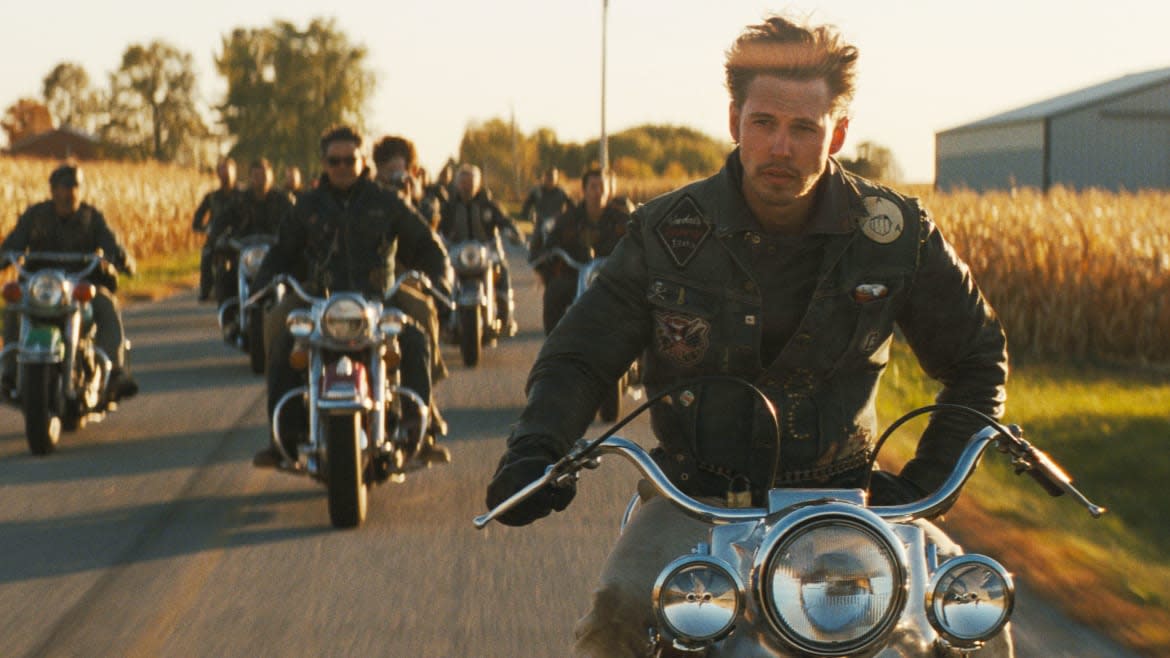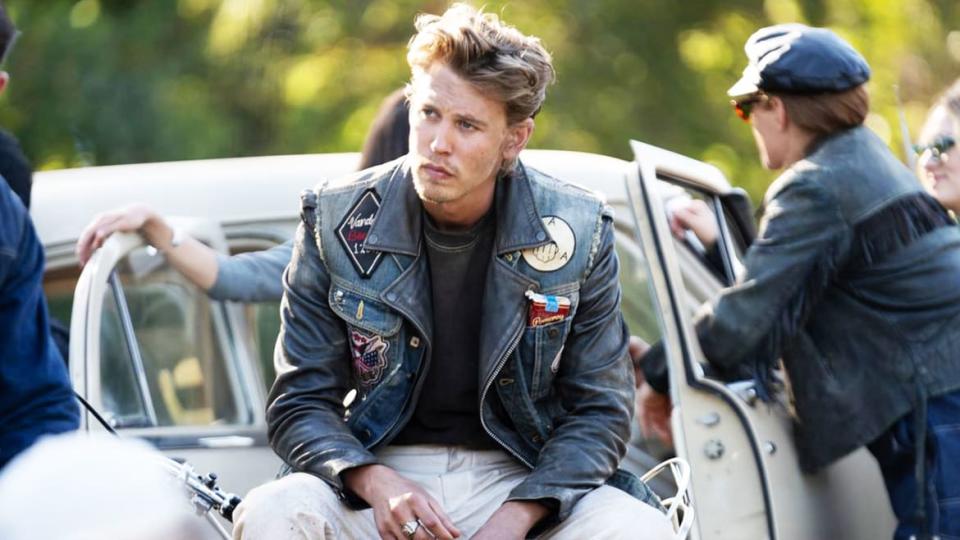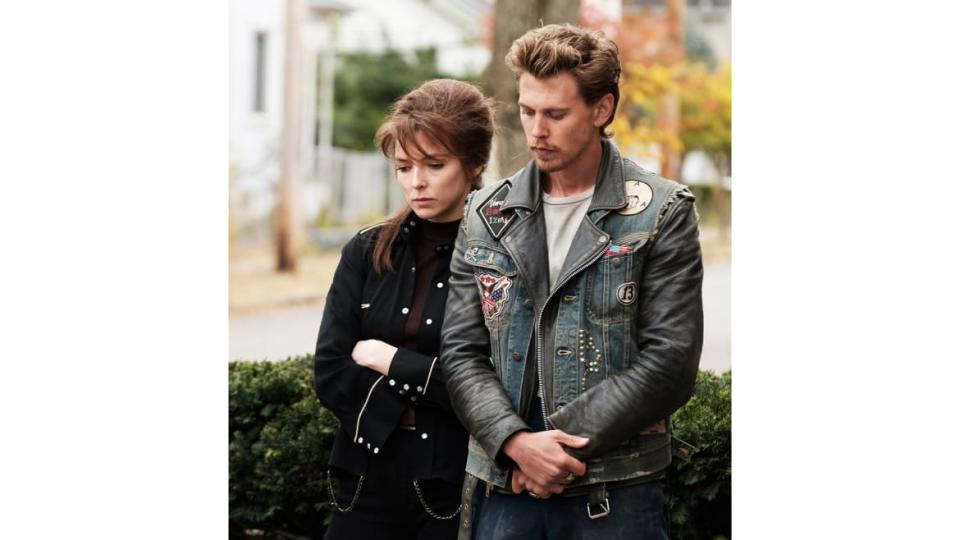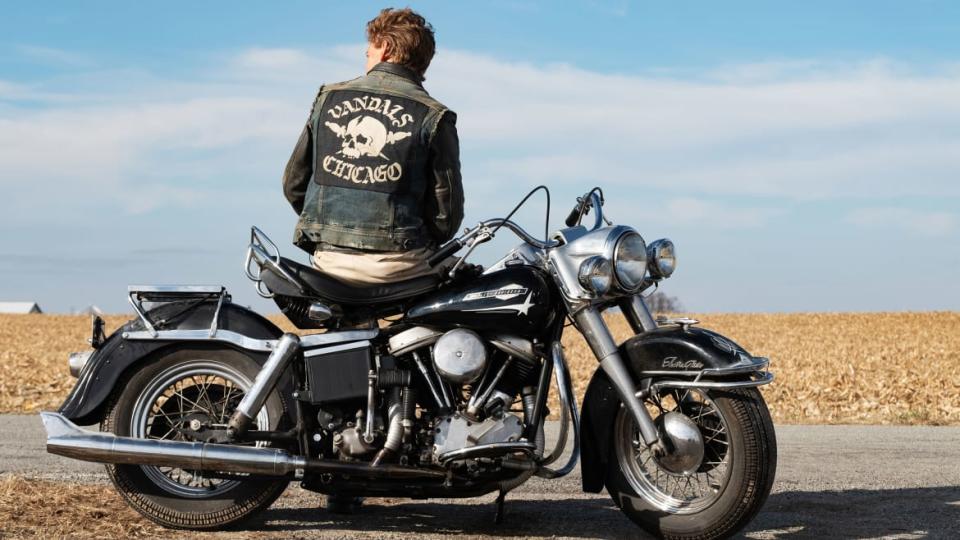Tom Hardy and Austin Butler’s ‘The Bikeriders’ Is So Sexy It’ll Leave You Sweating

In The Bikeriders, Tom Hardy and Austin Butler play motorcycle gang bigwigs who are so preternaturally cool that smokey, sweaty charisma seems to be seeping out of their pores. Every drag of a cigarette, swig from a beer bottle, and rev of their steel horses’ engines exudes a potent degree of manliness. So overpowering is their machismo that when they ride into a Midwestern small town, the sight of them in the morning sunlight is enough to compel a two-bit crook to stop stealing hubcaps and gaze at their majesty—and, subsequently, to embrace his own inner tough guy by smashing a mouthy citizen’s car headlight.
Writer/director Jeff Nichols’ first feature since 2016’s Midnight Special and Loving, The Bikeriders, which hits theaters June 21, is loosely based on Danny Lyon’s 1967 photography book of the same name. Consequently, it’s far more interested in conjuring a mood and an attitude than it is in telling a proper story. There’s only the wispiest of narratives to be found in this period piece, which thrives on the back of its evocative imagery, an era-faithful score by David Wingo, and lead turns from Hardy and Butler that are all about laconic and brash poses. Unabashedly romanticizing its subjects as paragons of strength and style, it doesn’t have much substance lurking beneath its surface—but then, with a surface like this, it doesn’t really need any.
Set between 1965 and 1973, The Bikeriders concerns the Vandals, a Chicago motorcycle club founded and led by Johnny (Hardy), a hulking bruiser with a scruffy face, slicked back hair, and a nasally voice. Johnny isn’t a man of many words but when he speaks, he does so with menacing authority, and he’s inspired to start the gang after watching Marlon Brando in The Wild One—an anecdote that, told in hindsight narration, lends the material a mythological art-imitating-life-imitating-art element. His original members include reliable right-hand man Brucie (Damon Herriman), mechanic Cal (Boyd Holbrook), disheveled Zipco (Michael Shannon), jokey duo Corky (Karl Glusman) and Wahoo (Beau Knapp), and goofy Cockroach (Emory Cohen). Most striking of all, however, is Benny (Butler), whose origins are a mystery and whose love of riding—and disinterest in convention and commitments—makes him the embodiment of outlaw biker culture.
The Vandals’ tale is told in flashback via two separate interviews (one in ’65, one in ’73) conducted by photographer Danny (Mike Faist) with Kathy (Jodie Comer). Invited to a biker gathering, Kathy bristles at the men’s boorishness and yet is captivated by Benny, whose silent, self-possessed hunkiness rivals that of James Dean. Benny is so nonchalantly sexy that when he drives Kathy home and proceeds to wait outside her house all night and the next day—thereby greatly angering her husband—she instinctively swoons. They’re soon a couple, meaning that she’s spending virtually all her waking hours with the Vandals. In a bit of irony pointed out by Kathy, the group is comprised of inveterate rulebreakers who promptly make up their own rules. From a plot perspective, the most important of those states that any member can challenge Johnny for leadership via a fight with fists or knives, as one does during an early discussion about permitting the establishment of additional club chapters.
Finally: ‘Fresh Kills’ Is the Best Mafia Movie in Ages
There are plenty of incidents in The Bikeriders, and the majority of them function as stand-alone snapshots of these individuals at a particular time and place. Traveling through tiny hamlets and past vast cornfields, the Vandals has no purpose except to provide companionship and camaraderie for dudes who want to hang out with other dudes, doing nothing more than boozing, puffing, brawling, and wildly carousing until they pass out (or wind up in the hospital) and start the entire process all over again the following day. They’re loyal and honorable and have each other’s backs (sometimes to the point of homoeroticism), and thus when Benny is brutally jumped in the opening scene for refusing to take off his “colors” (i.e. Vandals jacket), his allegiance to himself and his crew is automatically rewarded by Johnny, who has the perpetrators thrashed and the bar torched. When the cops and firemen arrive, they stand by as Johnny and his mates watch it burn because, as Johnny says, “They’re afraid of us.”

Austin Butler
The Bikeriders is a quasi-gangster picture, complete with godfather-ish behavior by Johnny, a collection of memorably dissolute supporting characters, and tensions born from both the ascendancy of a new Vietnam-scarred, drug-pushing generation, and from Kathy’s burning desire for Benny to give up this wayward life and settle down. Challengers to the throne and numerous scuffles dot the chronologically fragmented action, and Nichols shoots it all with an eye toward idealization; a shot of a diner patron staring out a storefront window as bikers and pursuing cop cars race by could almost be a still photograph. Nichols routinely strives for iconography, and the fact that he achieves it on more than a few occasions helps the film clear some of its speed bumps, the worst of which is Comer’s Midwestern accent, which is so thick and affected that, along with her array of eyerolls, sighs, and smirks, cause her performance to ring false.

Jodie Comer and Austin Butler
Codes of honor are followed no matter the cost, and tragedies are as random as they are inevitable. Nichols casts it all in such celebratory terms that even when things turn darker—as at a party where Kathy becomes the target of some rape-y recruits—there’s no condemnation; rather, that incident merely hammers home to Johnny that the “golden age of motorcycles” is coming to an abrupt end. With Hardy and Butler radiating ragamuffin hooligan charm, poise, and scariness as spiritual brothers bonded by an instinctual need for freedom and power, the film lionizes with great, uncomplicated gusto, right up to a finale which accepts that all good things must come to an end and yet remains wistful for the glory days gone by.

Austin Butler
Stripped clean of complications so it can better memorialize its protagonists’ stoutness, friendships, and devotion to their rebellious ethos, it’s a bro-fest of the most masculine order. If that ultimately makes it a tad shallow, it also renders it a potential future guys-guy cult classic—not to mention, courtesy of its leads, a testament to the vitality of megawatt movie magnetism.
Get the Daily Beast's biggest scoops and scandals delivered right to your inbox. Sign up now.
Stay informed and gain unlimited access to the Daily Beast's unmatched reporting. Subscribe now.

 Yahoo News
Yahoo News 
